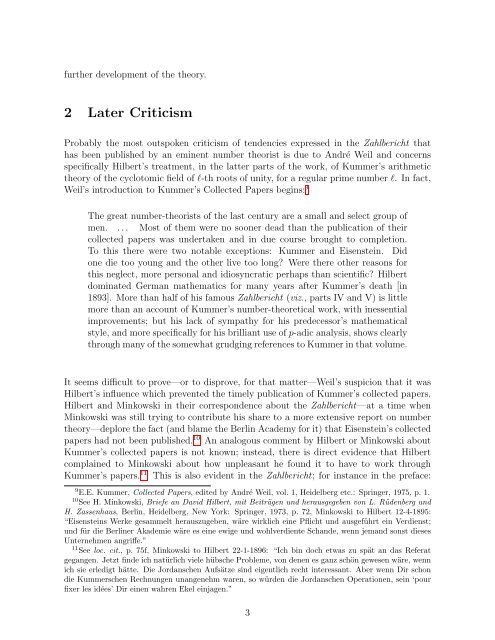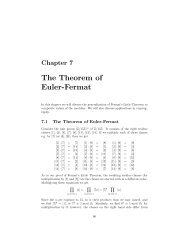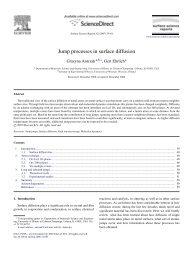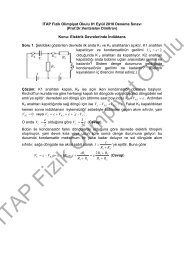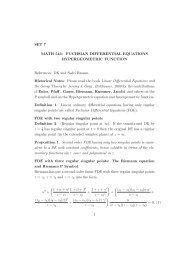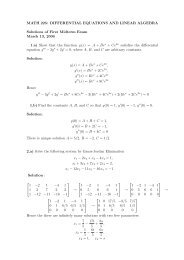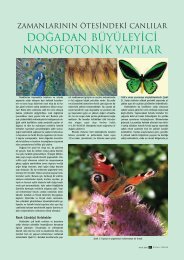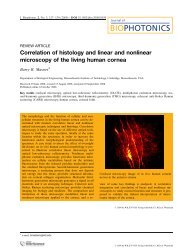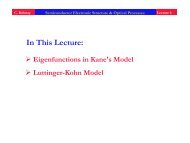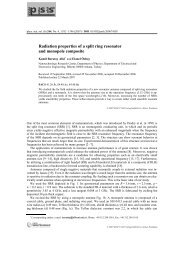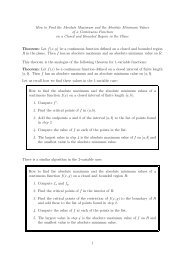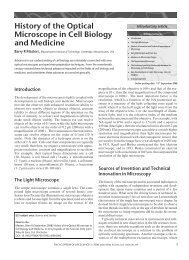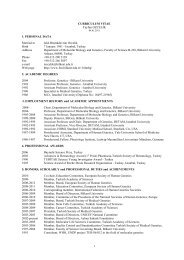Introduction to the English Edition of Hilbert's Zahlbericht
Introduction to the English Edition of Hilbert's Zahlbericht
Introduction to the English Edition of Hilbert's Zahlbericht
Create successful ePaper yourself
Turn your PDF publications into a flip-book with our unique Google optimized e-Paper software.
fur<strong>the</strong>r development <strong>of</strong> <strong>the</strong> <strong>the</strong>ory.<br />
2 Later Criticism<br />
Probably <strong>the</strong> most outspoken criticism <strong>of</strong> tendencies expressed in <strong>the</strong> <strong>Zahlbericht</strong> that<br />
has been published by an eminent number <strong>the</strong>orist is due <strong>to</strong> André Weil and concerns<br />
specifically Hilbert’s treatment, in <strong>the</strong> latter parts <strong>of</strong> <strong>the</strong> work, <strong>of</strong> Kummer’s arithmetic<br />
<strong>the</strong>ory <strong>of</strong> <strong>the</strong> cyclo<strong>to</strong>mic field <strong>of</strong> ℓ-th roots <strong>of</strong> unity, for a regular prime number ℓ. In fact,<br />
Weil’s introduction <strong>to</strong> Kummer’s Collected Papers begins: 9<br />
The great number-<strong>the</strong>orists <strong>of</strong> <strong>the</strong> last century are a small and select group <strong>of</strong><br />
men. . . . Most <strong>of</strong> <strong>the</strong>m were no sooner dead than <strong>the</strong> publication <strong>of</strong> <strong>the</strong>ir<br />
collected papers was undertaken and in due course brought <strong>to</strong> completion.<br />
To this <strong>the</strong>re were two notable exceptions: Kummer and Eisenstein. Did<br />
one die <strong>to</strong>o young and <strong>the</strong> o<strong>the</strong>r live <strong>to</strong>o long? Were <strong>the</strong>re o<strong>the</strong>r reasons for<br />
this neglect, more personal and idiosyncratic perhaps than scientific? Hilbert<br />
dominated German ma<strong>the</strong>matics for many years after Kummer’s death [in<br />
1893]. More than half <strong>of</strong> his famous <strong>Zahlbericht</strong> (viz., parts IV and V) is little<br />
more than an account <strong>of</strong> Kummer’s number-<strong>the</strong>oretical work, with inessential<br />
improvements; but his lack <strong>of</strong> sympathy for his predecessor’s ma<strong>the</strong>matical<br />
style, and more specifically for his brilliant use <strong>of</strong> p-adic analysis, shows clearly<br />
through many <strong>of</strong> <strong>the</strong> somewhat grudging references <strong>to</strong> Kummer in that volume.<br />
It seems difficult <strong>to</strong> prove—or <strong>to</strong> disprove, for that matter—Weil’s suspicion that it was<br />
Hilbert’s influence which prevented <strong>the</strong> timely publication <strong>of</strong> Kummer’s collected papers.<br />
Hilbert and Minkowski in <strong>the</strong>ir correspondence about <strong>the</strong> <strong>Zahlbericht</strong>—at a time when<br />
Minkowski was still trying <strong>to</strong> contribute his share <strong>to</strong> a more extensive report on number<br />
<strong>the</strong>ory—deplore <strong>the</strong> fact (and blame <strong>the</strong> Berlin Academy for it) that Eisenstein’s collected<br />
papers had not been published. 10 An analogous comment by Hilbert or Minkowski about<br />
Kummer’s collected papers is not known; instead, <strong>the</strong>re is direct evidence that Hilbert<br />
complained <strong>to</strong> Minkowski about how unpleasant he found it <strong>to</strong> have <strong>to</strong> work through<br />
Kummer’s papers. 11 This is also evident in <strong>the</strong> <strong>Zahlbericht</strong>; for instance in <strong>the</strong> preface:<br />
9 E.E. Kummer, Collected Papers, edited by André Weil, vol. 1, Heidelberg etc.: Springer, 1975, p. 1.<br />
10 See H. Minkowski, Briefe an David Hilbert, mit Beiträgen und herausgegeben von L. Rüdenberg und<br />
H. Zassenhaus, Berlin, Heidelberg, New York: Springer, 1973, p. 72, Minkowski <strong>to</strong> Hilbert 12-4-1895:<br />
“Eisensteins Werke gesammelt herauszugeben, wäre wirklich eine Pflicht und ausgeführt ein Verdienst;<br />
und für die Berliner Akademie wäre es eine ewige und wohlverdiente Schande, wenn jemand sonst dieses<br />
Unternehmen angriffe.”<br />
11 See loc. cit., p. 75f, Minkowski <strong>to</strong> Hilbert 22-1-1896: “Ich bin doch etwas zu spät an das Referat<br />
gegangen. Jetzt finde ich natürlich viele hübsche Probleme, von denen es ganz schön gewesen wäre, wenn<br />
ich sie erledigt hätte. Die Jordanschen Aufsätze sind eigentlich recht interessant. Aber wenn Dir schon<br />
die Kummerschen Rechnungen unangenehm waren, so würden die Jordanschen Operationen, sein ‘pour<br />
fixer les idées’ Dir einen wahren Ekel einjagen.”<br />
3


